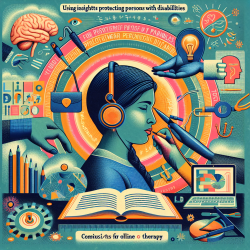Empowering Practitioners with Insights from The Bangladeshi Rights and Protection of Persons With Disability Act of 2013
The Bangladeshi Rights and Protection of Persons with Disability Act of 2013 offers critical insights into the support structures for children with disabilities (CWDs) and their families. As practitioners dedicated to creating great outcomes for children, it is essential to leverage the findings of this policy analysis to improve our practices and advocate for necessary changes.
Key Takeaways from the Act
The Act aligns with the United Nations Convention on the Rights of Persons with Disabilities (UNCRPD) and highlights several support mechanisms for CWDs and their families. Here are some of the key provisions:
- Inclusive Education: The Act mandates inclusive and special education, ensuring that students with and without disabilities study together. It also emphasizes reasonable accommodations and flexibility in school-going age for CWDs.
- Healthcare Access: The Act pledges access to the highest attainable standard of healthcare, including free medical services and assistive devices for those in need.
- Social Inclusion: The Act includes provisions for CWDs in social safety-net programs and mandates reserved seats in public transportation.
- Accountability and Antidiscrimination: The Act outlines strategies to prevent discrimination and ensures accountability through various committees at national and regional levels.
Improving Practitioner Skills
To enhance your practice, consider the following strategies based on the Act's findings:
- Embrace Inclusive Education: Advocate for and implement inclusive education practices in your therapy sessions. Collaborate with schools to ensure that CWDs receive the necessary accommodations and support.
- Promote Healthcare Access: Assist families in navigating healthcare services and advocate for free medical services and assistive devices for CWDs.
- Encourage Social Inclusion: Support families in accessing social safety-net programs and ensure that CWDs can participate in community activities and public transportation.
- Advocate for Policy Changes: Engage in policy advocacy to address gaps in the Act, such as the need for detailed provisions on autonomy, privacy, and family-centered services.
Encouraging Further Research
While the Act provides a strong foundation, there are areas that require further research and policy development. Practitioners can contribute by:
- Conducting Empirical Research: Gather data on the implementation of the Act and its impact on CWDs and their families. Use this data to inform policy advocacy and practice improvements.
- Collaborating with Stakeholders: Work with families, schools, and policymakers to identify and address gaps in the current support structures.
- Exploring International Best Practices: Compare the Act with international frameworks and best practices to identify areas for improvement and adaptation.
To read the original research paper, please follow this link: The Bangladeshi Rights and Protection of Persons With Disability Act of 2013: A Policy Analysis










